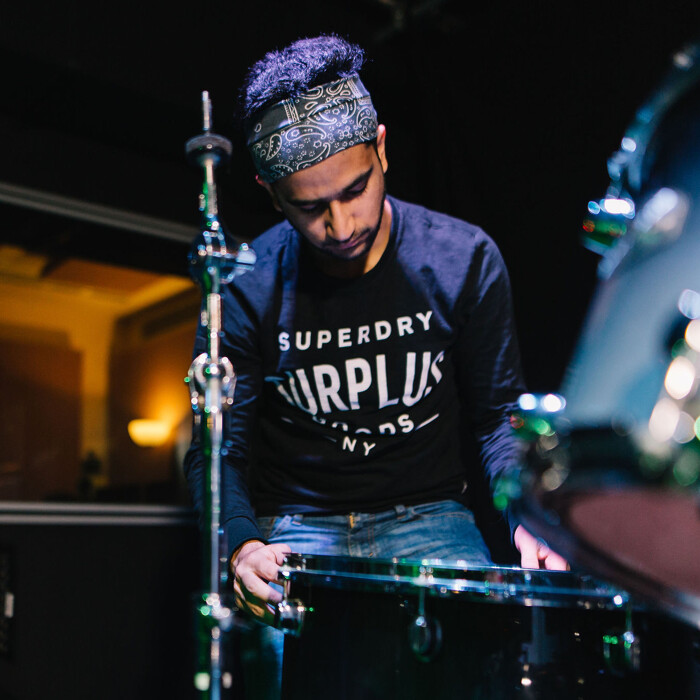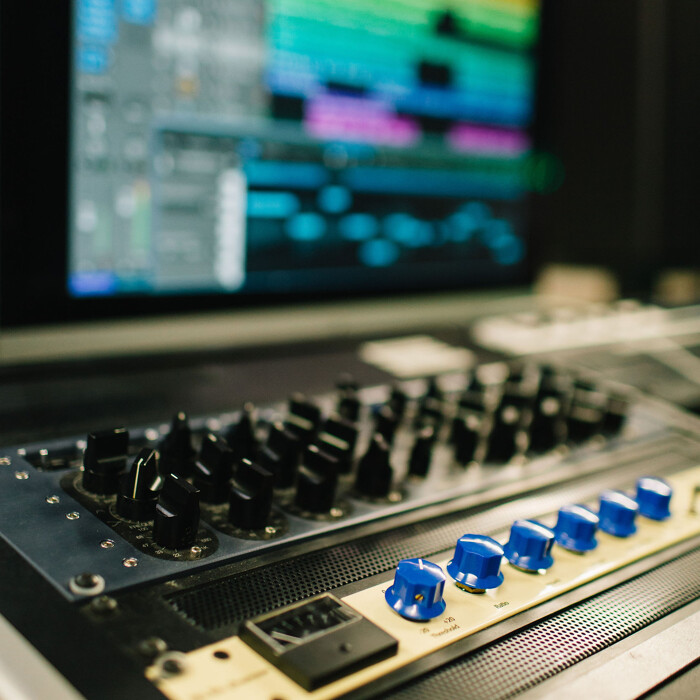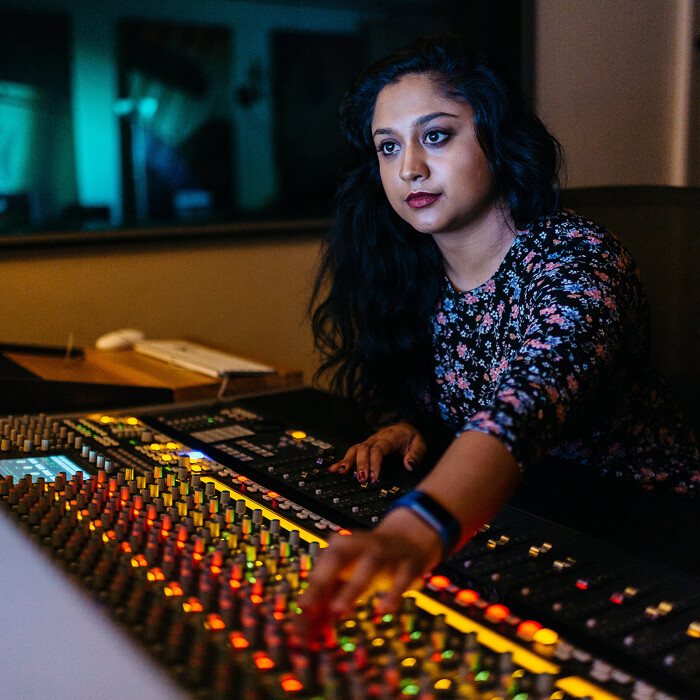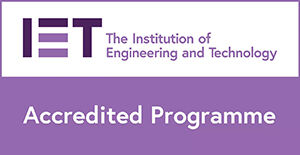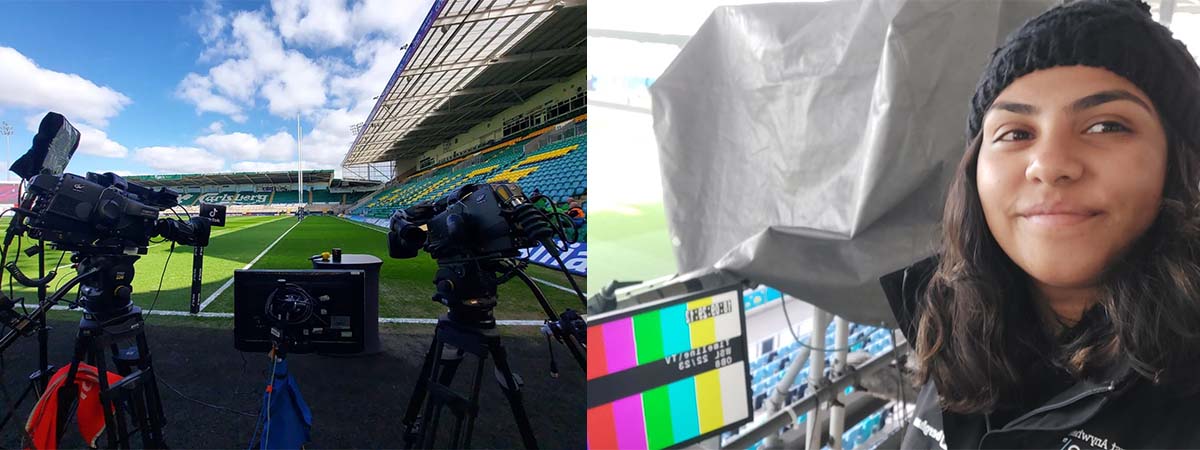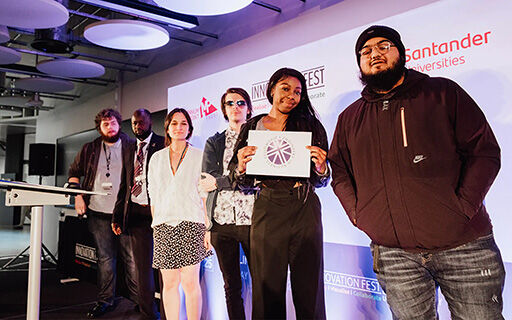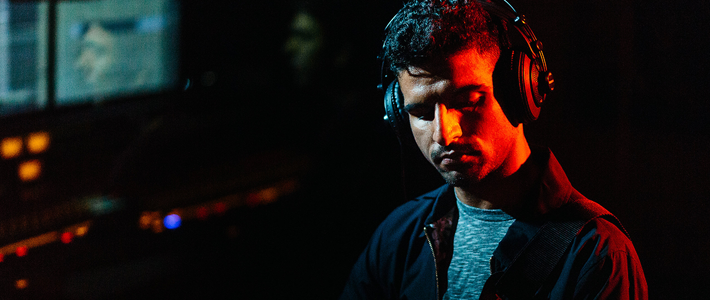
Music Technology - BSc (Hons)
Currently viewing course to start in 2025/26 Entry.
Want to be an established music technician? Study our BSc (Hons) Music Technology degree at Birmingham City University. This course is aimed at the technical music producer, and will train you to use technology to create, record and distribute music. We will provide you with industry connections, live projects and a wide, in-depth knowledge of the field....
- Level Undergraduate
- Study mode Full Time
- Award BSc (Hons)
- Start date September 2025
- Fees View course fees
- Subject
- Location City Centre
This course is:
Available with Professional Placement year
Open to International Students
Overview
I'm a third year Music Technology student. When I was looking for Music Technology courses, Birmingham City University really stood out to me. I was keen on attending a Bachelor of Science and the course really focussed on the science aspects as well as maintaining the artistic elements of music and sound production. The support of the tutors has been fantastic. The professional standard and the facilities on campus are great due to their accessibility around the clock. The easy access to studios has been extremely helpful in completing my work and keeping on top of deadlines. At BCU, there's been a heavy focus on employability and what I could do with all aspects of my degree. The university has organised the industrial mentor forum, a space where students can communicate with alumni and people within the industry. The Acoustics Special Interest Group also consisted of more bespoke talks from people within the acoustics industry about different aspects of the work and how individual companies run. This is how I developed contact with an acoustic consultancy to complete my placement year. I act as an Acoustic Technician at Dragonfly Consulting. It went so well that I'm returning upon my graduation to continue working with them. The university has given me opportunities I don't think I would have received anywhere else.
I'm a second year computer science student studying at Birmingham City University. As a Computing student, there are plenty of computer labs available. There's entire rooms filled with Cisco networking equipment, as well as laptops that can be rented out to complete your work. Several of the facilities have now moved over to STEAMhouse, which is a £70 million build that is now the new home for Computing and Digital Technology students. One of the main things for me was getting employment at the end of my university degree. And Birmingham City University offers a wealth support for moving into the work environment. The course is a very important focus and a very industry focussed as well. I've been offered roles as a student demonstrator for Python programming. I found that the best way to show that you've understood something is to be able to teach somebody else.
I'm studying Computer Networks and Security. So far, I've really enjoyed my time at BCU. I felt really included within the student community. For the past two years, I've been involved in Innovation Fest. This is an annual event that showcases student work from the faculty. A lot of employers visit this festival, which allows us to widen our professional network. Throughout my time at BCU, I've had some time to
develop a relationship with the Careers+ team and go through tailoring my CV and my cover letters with them. Because of this, I have been presented with many opportunities which they have tailored to me and my needs. Through this, I was encouraged to apply for the women in tech competition.
So it was a one week program and I was working with the team from Cyferd. It's a software company,
and I successfully won and have taken up the placement year with them as a Junior Development Lead.
I look forward to coming back and applying the skills I've learnt throughout my placement and applied them within my studies.
Want to be an established music technician? Study our BSc (Hons) Music Technology degree at Birmingham City University. This course is aimed at the technical music producer, and will train you to use technology to create, record and distribute music. We will provide you with industry connections, live projects and a wide, in-depth knowledge of the field.
You’ll leave with a valuable blend of creative ability and practical skills in music production, alongside solid business awareness and a strong understanding of technology.

Introducing STEAMhouse
STEAMhouse is a centre for technology, innovation, creative thinking, prototyping and business development. Our £70 million pound building is the home for all of our Computing courses.
What's covered in this course?
Our BSc (Hons) Music Technology course was set up to meet the growing demand for people within the music and audio industries who are able to use technology to assist in the creation, performance and distribution of music.
We will train you to become the next generation of musically-informed engineers, with a strong understanding of underlying technical principles in order to make informed decisions about appropriate technologies.
You will analyse and critically evaluate live musical events and sound recordings, as well as music technology products, systems, processes and designs. You’ll also have the opportunity to study in our world-class facilities in our Royal Birmingham Conservatoire.
Exploring a wealth of creative ideas and techniques, we will encourage you to think innovatively and respond to the needs of industry. Employability is a key factor incorporated within the course, and we are dedicated to providing you with the skills and knowledge to jump right into a creative role.
Professional Placement Year
This course offers an optional professional placement year. This allows you to spend a whole year with an employer, following successful completion of your second year, and is a great way to find out more about your chosen career. Some students even return to the same employers after completing their studies.
If you choose to pursue a placement year, you will need to find a suitable placement to complement your chosen area of study. You will be able to draw on the University’s extensive network of local, regional, and national employers, and the support of our Careers teams. If you are able to secure a placement, you can request to be transferred to the placement version of the course.
Please note that fees are payable during your placement year, equivalent to 20% of the total full-time course fee for that year.
Accredited By
This course is accredited by:
"It's a wonderful job - quite honestly something I never thought I would be doing at this stage - and I get to work with some fantastic people, see plenty of movies, binge on Pro Tools and meet celebrities!"Jason Rosehill, audio/visual producer for a film PR company
“The pool of lecturers is great at Birmingham City University and the knowledge from their previous industry experience is fantastic. The studios are great quality and with all new facilities it’s a great time to join.’’ Ben Parker, Promotions Executive at EMI Production Music
“The course gave me the opportunity to really hone my skills in recording live orchestras and more classical musicians than I would otherwise have had the opportunity to do.” Alastair Jamieson, owner / producer at Park Studios JQ, Birmingham.
Why Choose Us?
- Top 20 in the UK for student satisfaction for Music (Complete University Guide 2025)
- Excellent preparation for industry - Learn skills for a range of technology-focused career paths in the highly dynamic music technology environment. Our students have gone on to work at Focusrite, Universal, BBC, Audient and The Music Group.
- Range of opportunities - Our graduates have successfully entered the music and audio industry in production, sound design and audio through to technical development, acoustic consultancy and education.
- Unique position in UK higher education - The BSc (Hons) Music Technology degree holds a unique position, drawing on the dual strengths of a cutting-edge technology institution and a premier Conservatoire.
- Undertake a Professional Placement Year - You can choose to take a one-year work placement between your second and final year, providing you with valuable work experience.
- State-of-the-art campus and facilities - You’ll be taught across our three City Centre Campuses that include; Millennium Point, which has recently had a £6.5 million investment in facilities; the £57 million Royal Birmingham Conservatoire; and £62 million Parkside Campus. Find out more about our campuses.
- Be inspired - Read about how Kristian collaborated with music students in studios while studying.
Similar Courses
Open Days
Join us for an Open Day where you'll be able to learn about this course in detail, chat to students, explore our campus and tour accommodation.
Next Open Day: 28 June 2025
Entry Requirements
These entry requirements apply for entry in 2025/26.
All required qualifications/grades must have been achieved and evidenced at the earliest opportunity after accepting an offer to help confirm admission and allow for on-time enrolment. This can also include other requirements, like a fee status form and relevant documents. Applicants can track their application and outstanding information requests through their BCU mySRS account.
Essential requirements
- Standard offer: 112 UCAS Tariff points. Learn more about UCAS Tariff points.
- Accelerate offer: 80 UCAS Tariff points. Find out more about BCU Accelerate.
If you have a qualification that is not listed, please contact us.
Don’t meet our entry requirements?
You could apply for a foundation course or a course at our International College. These routes have lower entry requirements and act as the bridge to a full degree. To find out more, please select your status:
Fees & How to Apply
UK students
Annual and modular tuition fees shown are applicable to the first year of study. The University reserves the right to increase fees for subsequent years of study in line with increases in inflation (capped at 5%) or to reflect changes in Government funding policies or changes agreed by Parliament. View fees for continuing students.
Award: BSc (Hons)
Starting: Sep 2025
- Mode
- Duration
- Fees
- Full Time
- 3 years
- £9,535 in 2025/26 ✱ Important note for this price
- Apply via UCAS
(↩Back to price) * The Government is proposing to increase the cap on full-time regulated tuition fees to £9,535 for 2025/26 and the University is planning on increasing fees to that maximum level once legislation is enacted. Part-time fees are charged pro-rata, where applicable.
International students
Annual and modular tuition fees shown are applicable to the first year of study. The University reserves the right to increase fees for subsequent years of study in line with increases in inflation (capped at 5%) or to reflect changes in Government funding policies or changes agreed by Parliament. View fees for continuing students.
Award: BSc (Hons)
Starting: Sep 2025
- Mode
- Duration
- Fees
- Full Time
- 3 years
- £17,690 in 2025/26
Guidance for UK students
UK students applying for most undergraduate degree courses in the UK will need to apply through UCAS.
The Universities and Colleges Admissions Service (UCAS) is a UK organisation responsible for managing applications to university and college.
Applying through UCAS
- Register with UCAS
- Login to UCAS and complete your details
- Select your course and write a personal statement
- Get a reference
- Pay your application fee and submit your application
Guidance for International students
There are three ways to apply:
1) Direct to the University
You will need to complete our International Application Form and Equal Opportunities Form, and submit them together with scan copies of your original academic transcripts and certificates.
2) Through a country representative
Our in-country representatives can help you make your application and apply for a visa. They can also offer advice on travel, living in the UK and studying abroad.
3) Through UCAS
If you are applying for an undergraduate degree or a Higher National Diploma (HND), you can apply through the UK’s Universities and Colleges Admissions Service (UCAS).
You can request a printed form from your school or nearest British Council office. You will be charged for applying through UCAS. Birmingham City University’s UCAS code is B25 BCITY.
Personal statement
UK / EU students are required to submit a personal statement as part of their application for this course.*
The personal statement gives you a crucial opportunity to say why you’re applying and why the institution should accept you.
Here are the key areas you’ll need to address:
- Course choice - Why does this course appeal? What areas are of particular interest?
- Career plans - If you have a specific career in mind, say how your chosen course will help you pursue this goal.
- Work experience - Mention any work that is relevant to your subject, highlighting the skills and experience gained.
- School or college experience - Highlight skills gained at school/college, eg summer schools or mentoring activities.
- Non-accredited skills or achievement - eg Duke of Edinburgh Award, Young Enterprise scheme.
You should also mention your future plans – if you’re planning to take a year out, don't forget to give your reasons. Talk about any subjects you’re studying that don’t have a formal assessment and any sponsorships or placements you’ve applied for. And don't be scared to add in details about your social, sports or leisure interests.
Worried about Personal Statements?
If you've got no idea where to start or just want to check you're on the right track, we’ve got expert advice and real examples from our students to help you nail your personal statement. You can even download our ultimate personal statement guide for free.
*Non-EU students are not required to submit a personal statement when applying for this course.

Financial Support
We offer further information on possible undergraduate financial support. This includes the type of loans, grants and scholarships available both from the government and from Birmingham City University.
Course in Depth
Year One
In order to complete this course a student must successfully complete all the following CORE modules (totalling 120 credits):
This module will develop students’ understanding of acoustic fundamentals and will also develop a methodology for testing a range of musical instruments, using a range of applicable techniques to extract and analyse data.
This module provides a base for you to develop key skills in recording and mixing, imperative for all fields of music technology and sound engineering. You will become familiar with the hybrid analogue mixing/digital recording studio environment and explore recording techniques and processes applicable to a wide range of acoustic and electric instruments. You will study analogue-based audio systems and processes, and microphone technology. You will apply this knowledge through a series of studio based recordings.
This module will introduce the nature of digital signals, presenting the international standards for digital audio data and the common processes involved in the capture and processing of digital signals. Later the module will allow you to develop strong skills in the standards for compression and distribution of digital audio signals and via a cross discipline approach, the module will illustrate common methods form computing and how valid these are for digital signal distribution.
This module is the first in the Music and Critical Studies theme of the degree programme. It provides the foundation for Music and Critical Studies in year 2, as well as giving context to the Music Technology and Sound Recording theme to the degree. This module will allow you to develop your musical awareness to give a setting and context to recording work across a range of genres. The aural training work raises aural awareness, widening the sense of musical appreciation, as well as providing a foundation for analysis of popular genres of music in year 2.
This module provides a base for you to develop key skills in sequencing and synthesis, imperative for all fields of music technology and sound engineering. This foundation will be built upon in level 5 and level 6 modules. Working with Digital Audio Workstation-based music applications and processing, especially with respect to MIDI programming and sequencing, you will gain experience of control systems and processes.
This module will develop key understanding of electronic fundamentals as applied to audio systems. Subject matter relates primarily to the analogue domain and will encourage you to develop your passion for the equipment found in the studios, learn how they sound and what makes them important during the recording, mixing and mastering process. Specific attention is applied to audio transducers; loudspeakers, microphones and headphones.
Year Two
In order to complete this course a student must successfully complete all the following CORE modules (totalling 120 credits):
This module will enable you to develop skills in key applications. It provides the opportunity to explore sampling and editing to lay a foundation for recording and production work in the module which follows and then for their advanced application at Level 6.
This module enables you to develop an individual recording portfolio based on your personal areas of interest whilst acquiring core techniques and skills in key applications. It provides the opportunity to explore editing, mixing and a range of recording techniques to lay a foundation for more advanced recording and production work at Level 6.
Digital technology is widely used throughout all the stages of the digital media processing, production, transmission, distribution and broadcasting activities. This module provides application based fundamental digital signal processing (DSP) knowledge and skills.
This module allows you to develop musicological, aural and performance analysis skills to support recording and production work in both year two and beyond. Technical aural training runs alongside musical aural training as required for the aspiring professional producer, engineer, or other form of music technologist.
This module will allow you to gain an in-depth understanding of global music and audio industries and how organisations have sought to adapt to technological change. This module enhances employability through the development of your understanding of employer requirements and approaches to recruitment.
This module will provide a practical insight into acoustic consultancy by assessing through theory and practice. It will cover building, interior and environmental acoustics in a way that aids employability by utilising methods that are typical of industrial practice.
Professional Placement Year (Optional)
In order to qualify for the award of BSc (Hons) Music Technology with Professional Placement Year a student must successfully complete the following module.
This module is designed to provide you with the opportunity to undertake a credit bearing, 40- week Professional Placement as an integral part of your Undergraduate Degree.
The purpose of the Professional Placement is to improve your employability skills which will, through the placement experience, allow you to evidence your professional skills, attitudes and behaviours at the point of entry to the postgraduate job market. Furthermore, by completing the Professional Placement, you will be able to develop and enhance your understanding of the professional work environment, relevant to your chosen field of study, and reflect critically on your own professional skills development within the workplace.
Year Three
In order to complete this course a student must successfully complete all the following CORE modules (totalling 120 credits):
The purpose of the module is to enable you to undertake a sustained, in-depth and research informed project exploring an area that is of personal interest to you. In agreement with your supervisor, you will decide upon your topic which will take the form of a practical outcome (artefact) with accompanying contextual material. The main consideration when choosing your topic is that it must be aligned to the programme you are studying, and you should consider the relevance of this topic to your future academic or professional development.
At this level, you will be expected to work independently but you will receive additional one-to-one support from your supervisor, who will be familiar with your chosen topic area. As you progress on the module, extra support will be available and this may take the form of group seminars, workshops and online materials that will help to develop your project.
This module is inherently interdisciplinary by providing an opportunity to design professional-standard music, Foley, dialogue and fx recording work whilst developing high-level skills in surround sound and editing audio to picture. This incorporates a range of skills crucial to potential employment in audio, film, game and VR-related industries.
This module provides an opportunity to develop professional-standard recording work within personal areas of interest assimilating all the skills acquired through the Sound Recording theme of the degree. You will acquire high-level skills in key areas such as mastering to facilitate sophisticated recording and production work.
You will be taught a variety mapping and control strategies for interactive music systems including the use of machine learning, dimensionality reduction and signal processing.
The module will provide an overview of user experience and interaction design. We will cover the theoretical and practical aspects of controllers, interfaces and instruments for musical expression, where both hardware and software Interface development will be discussed. We will provide details of augmented and hyper-instrument design.
The Game industry has overtaken the film industry in terms of revenue and audio is an integral part of developing high impact titles. In this module, you will explore the fundamentals of sound design for interactive environments, including sound effects, Foley sound, soundscapes and dialogue. The module will cover the integration of audio into game engines like Unity and middleware such as FMOD, and mixing techniques particular to the gaming industry.
Download course specification
Download nowCourse Structure
The course combines practical, hands-on training with theoretical and academic understanding, giving you a holistic conception of music technology. The course caters for students who are looking to broaden their career prospects across a range of music technology-related industries.
Attendance requirements
For more information on attendance requirements, course contact time and suggested self-study hours, download the course specification.

Athena Swan Bronze Award
We have successfully secured the Athena SWAN Departmental Bronze Award recognising a commitment to gender equality.
The Athena Swan Charter is a framework which is used across the globe to support and transform gender equality within higher education (HE) and research.
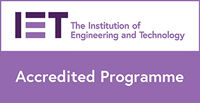
Institution of Engineering and Technology
This course is accredited by the Institution of Engineering and Technology (IET).
Hear from our students
Do you have a passion to work in the music industry? Hear from our Course Leader Dr Islah Ali-MacLachlan and a group of our students on why they chose to study music, the opportunities they have had so far and the impact of technology on the industry. Turn your passion into a career and discover the opportunities you could have after studying a degree in Music and Sound.
Employability
Enhancing Employability
Your experience at Birmingham City University will ensure you’ll graduate as a creative problem solver, with significant experience of professional industry-standard hardware, software and systems. You will leave with a global outlook, well-primed to engage with the technical and aesthetic issues that will challenge the music and audio industries in the globalised and technologically mediated world ahead.
The Module Industrial Mentors scheme supports the enhancement of graduate employability through on-going engagement with industry specialists throughout the course. This initiative is based on facilitating interactions between students and individuals working across the music technology and audio sector via module-based forums. This innovative approach allows you to explore specific subject areas with experienced professionals working in the field.
Graduate Profiles
Richard Siddall-Jones
Course : BSc (Hons) Music Technology
Senior Director, Global Digital Accounts at Warner Music Group
Richard found our course gave him a well-rounded understanding of the industry, providing him with further industry insight. Hear more about his experience and how he benefited from our facilities and staff’s knowledge.
Placements
The Music Technology course offers you the chance to take a ‘sandwich’ year, in which you can undertake an industrial placement. This industrial placement year will help you to build relationships with employers and further your industry knowledge. This takes place after the second year of study and extends the course duration to four years.
There are a wide range of potential placements that you may pursue such as working in recording studios, record companies, in professional audio and theatres. There are also various opportunities to pick up valuable work experience in areas such as live sound.
My placement was so varied, with new tasks each day, but there were some real highlights, including recording some quality records with amazing musicians, with some of the songs gaining airplay on BBC Radio 1 and BBC Radio 6 Music, and being sent on loan to a big London studio to assist the engineer who got me the placement in the first place. More generally, I gained real world experience in engineering musicians and how to run a business.
Craig Smith, placement student at Punch Studios
As well as providing relevant workplace experience that is sought by many employers, a placement provides an invaluable opportunity for you to develop your practical expertise, earn money and try out a potential career path. Our placements team will support you throughout the placements process; in the past students have undertaken placements at reputable companies such as Dolby UK, Focusrite and the Music Group.
Here is a short video showing the kind of work placement experience you could enjoy as part of your Music Technology degree:
Discover Music Technology at BCU
After graduating with a first-class degree, Deepali Mistry shares their experience and insights into how the course has propelled her into the world of work.
Innovation Fest
Innovation Fest is designed to foster entrepreneurship and support the development of our first-year students as future world-changers. The festival contributes to the knowledge economy, increasing students’ employability by providing genuine portfolio material.
Facilities & Staff

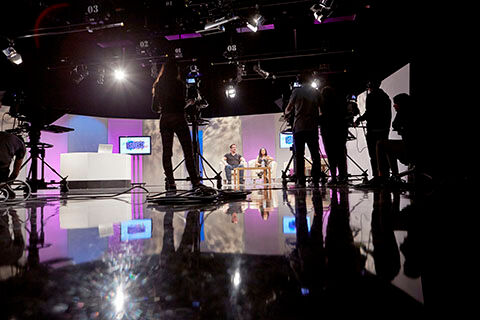
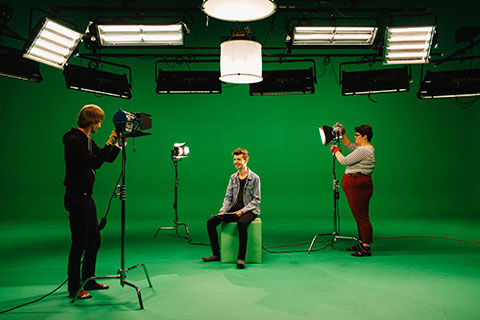
Our Facilities
Students on our Computing courses will have access to our labs, software, professional sound studios, computer games labs and industry-standard facilities to develop practical skills in audio, video and multimedia application development, content creation and more.
We are currently undertaking a £400 million investment programme in our facilities, including a major expansion of our City Centre Campus. This includes our brand new £70 million development, STEAMhouse, which is the new home for Computing students. This state-of-the-art centre will give you access to outstanding facilities and equipment, as well as opportunities to collaborate with businesses across multiple sectors and work on real industry-based projects.
Our facilities in Millennium Point have undergone a £6.5million investment with a new maker area, engineering labs/equipment and IT equipment.
Thanks to our partnerships with Cisco, Microsoft, Oracle, Juniper, SAS and LPI you will have access to the latest technology and facilities that reflect advanced professional practice. Our students also have access to software such as the Adobe Suite including Photoshop, InDesign and Illustrator.
Our Facilities
We are constantly investing in our estate and are currently in the process of spending £260 million on new learning facilities. This course will be taught at Millennium Point at the City Centre Campus.
The course is supported with a wide range of cutting-edge facilities in the City Centre Campus. We have a state-of-the-art computer games technology lab which contains high-performance PCs, Sony PlayStation development kits and a range of industry standard software including Unity, Unreal and a suite of professional Microsoft development tools.
We also have many open access areas where students can study together and even hire out laptops for use in these spaces and others within the university.
Within the University there are many internationally recognised research teams giving you the opportunity to collaborate with them on exciting interdisciplinary projects.
Computer networking
The laboratories are well-equipped for all our computer networking courses, as well as specialist areas for practical work such as voice-over internet protocol (VoIP), forensic and ethical hacking technologies, wireless and mobile technologies and radio frequency identification technologies to name but a few.
Software development and computer programming
There are a number of open access, software development and computer programming laboratories that can be used to develop systems and programmes, including database management systems such as MySQL, to name but a few.
Systems laboratories
Our embedded systems laboratories are used to develop real-time systems, such as specialist hardware training and development resources, and industrial-standard software development and simulation tools. These include microcontroller software and robotics design and development, to name but a few.
Electronic systems
To underpin the basic principles of electronic systems, we have a well-equipped laboratory of general and specialist test and measurement kits, including powered prototyping development boards, dual power supplies, frequency generators and counters and digital multi-meters to name but a few.
Forensic computing
Our successful development of forensic computing has led to a specialist forensics laboratory that is fully equipped with essential hardware and software for this sensitive area of study. The laboratory includes high-spec PCs with built-in multi interface Tableau write blockers, EnCase and FTK computer forensic software and steganography detection and analysis software, to name but a few.
Our staff
Dr Simon Hall
Head of Music Technology
Simon's musical interests are wide-ranging, which is reflected in his variety of work. He is an active composer, producer, recording engineer and bass trombone player as well as educator. He has worked across a range of genres in a range of capacities, with artists as diverse as Karlheinz Stockhausen, Pierre Boulez, Louis Andriessen and Heiner...
More about SimonDr Roy Priest
Associate Professor of Computing
Based in the College of Computing, Roy is College Academic Lead for Employability and Mobility. Prior to working in higher education, Roy was involved in various aspects of the music industry, as a professional musician and also working in artist management and legal and business affairs.
More about RoyBen West
Course Leader for BSc (Hons) Sound Engineering and Production, Lecturer in Audio Engineering
Ben West is the course leader for BSc (Hons) Sound Engineering and Production and leads the acoustics modules at BCU. Ben was an Acoustic Engineer in the automotive industry for ten years, holds an MSc in Acoustics with Audio Applications from the University of Salford, and is a Member of the Institute of Acoustics (MIOA).
More about BenProfessor Islah Ali-MacLachlan
Professor in Engineering Product Design
With nearly 30 years of academic experience and a prior background in industry, Prof. Ali-MacLachlan has made significant contributions to the fields of acoustics, audio engineering, and product design. His work combines research, teaching, and industry collaboration, focusing on creating innovative, practice-informed curricula and fostering...
More about IslahAlastair Jamieson
Lecturer in Sound and Music Technology
Alastair Jamieson is the course leader for the BSc (Hons) Music Technology. With over 20 years of experience in live sound and studio production, he brings extensive expertise from both professional and academic spheres. He has worked with artists including Adele, UB40, Duran Duran, Steel Pulse, and Music for Youth. Alastair designed, built, and...
More about Alastair